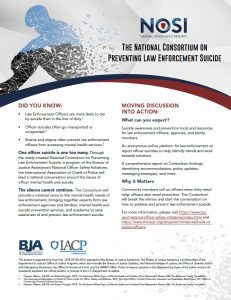
The health and safety of law enforcement officers has always been a priority of IACP and has been a significant issue that all of the past presidents of the IACP have devoted attention and resources to. From our recent inaugural Officer Safety and Wellness Symposium in San Antonio, Texas, to our current work in the areas of family wellness, resilience, and suicide prevention, the IACP stays on the cutting edge of issues impacting the well-being and safety of law enforcement.
As leaders, we must prioritize the safety and wellness of our officers and provide them with the proper resources and support to get home not only physically safe, but also well. As a field, we have long faced a powerful stigma that too often prevents officers from accessing mental health services in times of need. We have lost too many of our own to suicide, and we must commit to ensuring better services and outcomes for our officers.
We have lost too many of our own to suicide, and we must commit to ensuring better services and outcomes for our officers.
To this end, I am proud to announce that the IACP has launched the National Consortium on Preventing Law Enforcement Suicide (the Consortium), a project of the U.S. Department of Justice, Bureau of Justice Assistance’s (BJA’s) National Officer Safety Initiatives Program. The Consortium will provide a voice to address the mental health needs of law enforcement officers by convening multidisciplinary experts to raise awareness of and to prevent law enforcement suicide. Members of the Consortium include law enforcement officers and families, mental health and suicide prevention experts, and academics. Through a partnership with the National Action Alliance for Suicide Prevention (Action Alliance), we will expand our reach and increase our understanding of suicide prevention successes and promising practices from a broad range of public and private sector fields.
In a profession that prides itself on bravery and heroism, mental health concerns may be mistakenly viewed as weakness by some. Law enforcement suicide is often difficult to acknowledge and discuss. As law enforcement suicides continue to outnumber line-of-duty deaths each year, it is time to transform the conversation into action. We must end the silence and stigma of law enforcement suicide. With direction from BJA, the IACP, and the Action Alliance, the Consortium will leverage its collective expertise to produce a variety of resources directed toward halting law enforcement suicide. These resources will include a groundbreaking comprehensive report; recommended policy and procedure updates; research and creation of a national database; effective messaging strategies; and promising practices in suicide prevention, intervention, and postvention.

With each phase of IACP’s efforts to address this issue, we move the conversation forward. This project will build upon IACP’s strong foundation of work on law enforcement suicide and will continue under the direction of future IACP presidents, including IACP First Vice President Steven Casstevens, who will step into the office of president in October 2019.
Past efforts include the IACP Police Psychological Services Section’s compilation of materials designed to assist law enforcement agencies in developing suicide prevention and awareness programs. IACP has also addressed law enforcement suicide through projects such as the National Symposium on Law Enforcement Officer Suicide and Mental Health as well as the Suicide Prevention and Awareness Initiative. Tools developed through these projects address the unique needs of police executives, line-level officers, and families and friends of law enforcement personnel.
We choose a career in law enforcement because we are driven by a calling to help others and to protect and serve our communities. We know when we take the oath that our job comes with certain risks; however, that does not mean we do not need adequate support for the emotional and psychological impacts of the job. The IACP will continue to support the policing profession and ensure the wellness of our colleagues through projects such as the National Consortium on Preventing Law Enforcement Suicide in order to provide officers and agencies with the support and resources they need from recruitment on into retirement.
Stay safe. d
Please cite as
Paul M. Cell, “Moving the Conversation on Mental Health Forward,” President’s Message, Police Chief 86, no. 5 (May 2019): 6–7.


